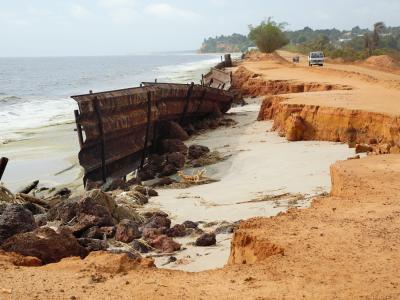NAP launch kick starts longer-term, integrated adaptation planning in DRC
Submitted by Louis da Costa on 05 October 2014

5 October 2014, Kinshasa, Democratic Republic of Congo (DRC) - A National Adaptation Plan (NAP) awareness and mobilization workshop was held at the Cercle Elaïs in Kinshasa, DRC between 1 - 3 October, 2014. The workshop was was led by the Government of DRC, and organised by the national NAP team with support from the UNDP Country Office and NAP-GSP. Technical support was provided by UNDP and GIZ.
At the workshop opening session, Etienne de Sousa, Team Leader Inclusive Growth and Sustainable Development, UNDP CO said; "The issues and challenges of climate change compel us to go beyond current efforts and to consider medium and long term approaches. It is imperative that adaptation be integrated into sectoral and/or local development plans. This is why a National Adaptation Plan (NAP) will be formulated. This workshop is an opportunity to build a base for inter-sectoral dialogue and to agree upon the type of mechanism and measures which should be put in place to foster enhanced resilience to climate change impacts and natural disasters."
Mr Katsuva, Representative of the Secretary General of the Ministry of Environment, said: "The NAP process will pave the way for climate change integration into development plans, both at national and provincial levels, and will further define a multisectoral framework to coordinate adaptation actions in our country".
The overall objective of the workshop was to assist the Congolese government to sensitize and mobilize stakeholders in the NAP process.
The specific objectives were to:
▪ Improve understanding of the PNA process according to the technical guidelines of the UNFCCC / LEG for the NAP process;
▪ Discuss lessons learned from initiatives to integrate climate change and others, for example through the NAPA;
▪ Discuss potential entry points for the NAP process in the DRC taking into account the political economy, the existing processes for policy, planning, strategy and budgeting and relevant projects and programs;
▪ Identify the technical and institutional needs and priorities to support the integration of adaptation to climate change in the medium and long term planning and national and subnational existing processes;
▪ Establish a roadmap that will guide the next steps in the implementation of the NAP for DRC
During the mission to DRC, the NAP-GSP team also identified specific needs and gaps in capabilities related to the advancement of NAP process in the DRC, towards the formulation of a NAP road map.
Following the NAP-GSP Training Worshop for African Francophone countries in Addis Ababa in April 2014, which was attended by a deligation from the DRC, a small DRC working group was set up to prepare the formulation of the NAP for the DRC.
The DRC NAP Training Workshop was an opportunity to plan and develop sectoral activities to support longer term adaptation planning. It also facilitated stakeholder dialogue to determine the appropriate institutional arrangements for the implementation of the NAP process. An important objective was to engage political decision makers and policy makers at the very start of the NAP process in DRC. Approximately 50 participants attended the workshop from the Min. of Environment, Min. of Finance, Min. of Agriculture, Min. of Planning, Min. of Health, Min. of Budget, Min. of water and Electricity resources, Min. of Home Affairs, Min. of Gender, Min. of Transport, METTELSAT (Meteorological institute), Civil Society, University of Kinshasa, UNEP, African Model Forests Network, AfDB and WB. Technical and Financial Partner representatives attended from UNDP, FAO, USAID, BM, ADB, GIZ, WHO and IFAD.
During the workshop, key stakeholders made presentations on the context of the NAP in the DRC and presented relevant activities, initiatives and findings. Specific technical presentations were delivered by NAP-GSP collaborating partners GIZ on vulnerability assessments and M&E, and by UNDP on appraising adaptation options and climate scenarios. The participants were also trained on the UNFCCC/LEG Technical Guidelines and discussed their implementation in working groups. On the last day of the workshop, the participants gathered in working groups to draft a roadmap for the NAP process for DRC.
The NAP process is building on achievements and lessons learned from previous adaptation initiatives implemented, including the economics of adaptation initiative. Representatives from the Interdepartmental Group on the Economics of Adaptation attended the NAP workshop, comprising 16 people from the Department of the Environment, Nature Conservation and Tourism, Ministry of Agriculture and Rural Development Khonde Makoso, Ministry of Water Resources and Electricity, Ministry of Transport and Communications, Ministry of Health, Dept. of Higher Education and Scientific Research, Dept. of Humanitarian Action, and Dept. of Gender, Women, Family and Children.